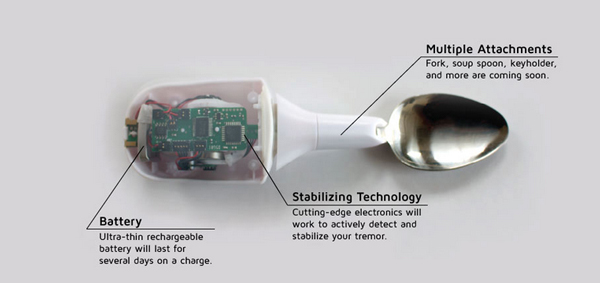Google has lengthened its leap into medtech by acquiring Lift Labs, a San Francisco startup that makes a spoon to help prevent patients with movement disorders from spilling their food.
The Internet giant will fold Lift Labs into Google X, the company’s long-term projects division. It announced the acquisition Wednesday on Google+, saying, “Their tremor-canceling device could improve quality of life for millions of people. We’re also going to explore how their technology could be used in other ways to improve the understanding and management of neurodegenerative diseases such as Parkinson’s disease and essential tremor.”
The Google acquisition news comes amid other news in the Parkinson’s device space, including an Australian company winning FDA approval for a wristwatch-like device that detects symptoms of the disease.

The Lift Labs spoon technology, as explained on the company's website.
An estimated 7 to 10 million people worldwide—including about 1 million in the United States—suffer from Parkinson’s disease, according to the Parkinson’s disease Foundation.
The spoon tech Google is acquiring works by emitting its own small movements to counteract those of patients with Parkinson’s disease and essential tremor disorder.
Google did not release the financial terms of the deal.
Lift Labs developed Liftware, a $295 spoon whose sensors and stabilization electronics detect and counteract movements caused by tremors, according to a report by recode.net. Check out this video demonstration of the spoon device.
The spoon can steady the motion by more than 70%, according to the company’s studies. Lift Labs is planning other attachments, including a fork and a key, recode.net reported. Lift Labs website also shows other technologies to aid Parkinson's patients, including a free smartphone app called Lift Stride that provides a cadence to help keep them moving along.
The Lift Labs acquisition is one of many moves Google has made into biotechnology, according to a reportby the New York Times. Parkinson’s is personal at Google. In 2009, Sergey Brin, a Google founder whose mother has Parkinson’s, donated money to a large study of the disease, the Times reported. Brin told the Times in 2009 that he has a genetic mutation that gives him a higher chance of developing Parkinson’s.
In other Parkinson’s device news, a wristwatch-like device that detects symptoms of Parkinson’s disease has earned 510(k) approval from the U.S. Food and Drug Administration.
The Personal KinetiGraph developed by Global Kinetics Corp. (Melbourne, AU) records patients’ motion data for up to 10 days, according to a statement by the company. After the patient trial period, the physician’s office downloads the data and sends it to Global Kinetics for processing. The company then generates a report and emails it to the physician, according to Global Kinetics.
The Personal KinetiGraph can also alert patients when it is time to take medication as prescribed and track when medication is taken to help improve treatment compliance. The deviceis already approved for use in Australia and Europe.





